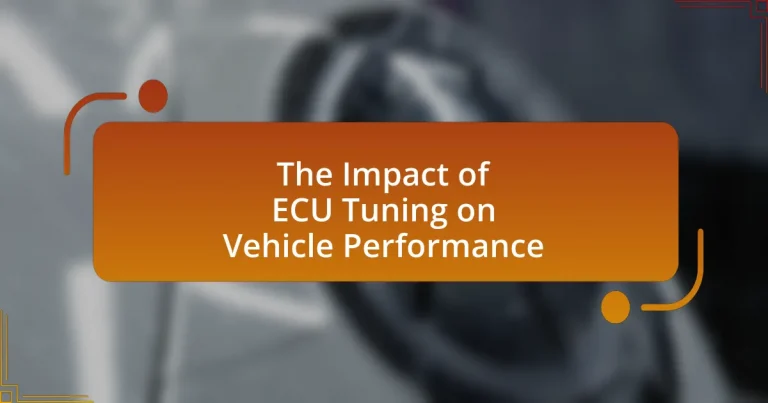ECU tuning refers to the modification of a vehicle’s engine control unit software to enhance performance metrics such as horsepower, torque, and fuel efficiency. This process involves adjusting critical parameters like fuel maps and ignition timing, which can lead to performance gains of 10-30% depending on the vehicle and tuning method. Various types of ECU tuning, including remapping and chip tuning, offer distinct advantages, but potential risks such as engine damage and warranty voiding must be considered. The article will explore the principles of ECU tuning, its impact on vehicle performance and fuel efficiency, legal considerations, and best practices for successful tuning.

What is ECU Tuning and How Does it Affect Vehicle Performance?
ECU tuning is the process of modifying the engine control unit (ECU) software to enhance vehicle performance. This modification can lead to increased horsepower, improved torque, and better fuel efficiency by optimizing fuel-air mixture, ignition timing, and other engine parameters. Studies have shown that vehicles can experience performance gains of up to 20% in horsepower and torque after ECU tuning, depending on the vehicle model and tuning method used.
What are the fundamental principles of ECU Tuning?
The fundamental principles of ECU tuning involve modifying the engine control unit’s software to optimize vehicle performance. This process includes adjusting parameters such as fuel maps, ignition timing, and boost levels to enhance power output, efficiency, and drivability. By recalibrating these settings, tuners can achieve significant improvements in horsepower and torque, often resulting in a more responsive driving experience. Studies have shown that proper ECU tuning can lead to performance gains of 10-30% in power, depending on the vehicle and modifications made.
How does ECU Tuning modify engine parameters?
ECU tuning modifies engine parameters by recalibrating the engine control unit’s software to optimize performance metrics such as fuel injection timing, air-fuel mixture, and ignition timing. This recalibration allows for increased horsepower and torque, improved throttle response, and enhanced fuel efficiency. For instance, studies have shown that remapping the ECU can lead to performance gains of up to 20% in certain vehicles, demonstrating the significant impact of tuning on engine output and efficiency.
What types of ECU Tuning are available?
There are several types of ECU tuning available, including remapping, chip tuning, and piggyback tuning. Remapping involves altering the vehicle’s existing software to optimize performance parameters such as fuel efficiency and power output. Chip tuning replaces the factory chip with a performance-enhancing chip, allowing for more significant modifications. Piggyback tuning adds an additional module that works alongside the factory ECU to adjust parameters without altering the original software. Each type of tuning can lead to improved vehicle performance, as evidenced by studies showing increased horsepower and torque after tuning modifications.
Why is ECU Tuning important for vehicle performance?
ECU tuning is important for vehicle performance because it optimizes engine parameters to enhance power, efficiency, and responsiveness. By recalibrating the engine control unit, tuning can increase horsepower and torque, improve fuel economy, and refine throttle response. Studies have shown that vehicles with tuned ECUs can achieve up to a 20% increase in power output and a 10% improvement in fuel efficiency, demonstrating the significant impact of tuning on overall vehicle performance.
What performance improvements can be expected from ECU Tuning?
ECU tuning can lead to significant performance improvements in vehicles, including increased horsepower, enhanced torque, and improved throttle response. By optimizing the engine’s fuel-air mixture and ignition timing, ECU tuning can elevate horsepower by 10% to 30% depending on the vehicle and modifications. Additionally, torque can see similar enhancements, providing better acceleration and overall driving experience. Studies indicate that vehicles with tuned ECUs often achieve better fuel efficiency due to more efficient combustion processes, further validating the benefits of ECU tuning.
How does ECU Tuning impact fuel efficiency?
ECU tuning can significantly improve fuel efficiency by optimizing the engine’s air-fuel mixture and ignition timing. This optimization allows for more complete combustion, which can lead to better fuel utilization and reduced waste. Studies have shown that vehicles with tuned ECUs can achieve fuel economy improvements of 5% to 20%, depending on the specific modifications and the vehicle’s original configuration. For example, a study by the Society of Automotive Engineers found that tuning could enhance fuel efficiency while maintaining or even increasing engine power output.
What are the potential risks associated with ECU Tuning?
The potential risks associated with ECU tuning include engine damage, voiding warranties, and increased emissions. Engine damage can occur due to improper tuning, which may lead to excessive heat or stress on engine components, resulting in failures. Voiding warranties is a significant concern, as many manufacturers will not cover repairs if modifications like ECU tuning are detected. Additionally, increased emissions can result from tuning that does not comply with environmental regulations, potentially leading to legal penalties and failing emissions tests. These risks highlight the importance of careful consideration and professional expertise when undertaking ECU tuning.
How can ECU Tuning affect engine longevity?
ECU tuning can positively affect engine longevity by optimizing fuel efficiency and reducing engine stress. By recalibrating the engine control unit, ECU tuning can enhance combustion efficiency, leading to lower emissions and improved fuel economy. This optimization reduces the frequency of engine knock and excessive heat, which are detrimental to engine components. Studies have shown that properly tuned engines can experience less wear and tear, as evidenced by a reduction in engine failures and maintenance costs over time. Therefore, when executed correctly, ECU tuning contributes to a longer lifespan for the engine.
What are the legal considerations regarding ECU Tuning?
ECU tuning can have significant legal considerations, primarily related to emissions regulations and vehicle warranty implications. In many jurisdictions, modifying the engine control unit (ECU) can lead to non-compliance with emissions standards set by regulatory bodies, such as the Environmental Protection Agency (EPA) in the United States, which enforces strict emissions laws. Additionally, manufacturers often void warranties if a vehicle is modified, including ECU tuning, as it can alter the vehicle’s performance and reliability. Therefore, individuals considering ECU tuning must ensure compliance with local laws and understand the potential impact on their vehicle’s warranty status.
How does ECU Tuning compare to other performance modifications?
ECU tuning offers a more comprehensive and customizable approach to performance modifications compared to other methods like exhaust upgrades or intake enhancements. While exhaust modifications can improve airflow and intake upgrades can increase engine efficiency, ECU tuning directly alters the engine’s control parameters, optimizing fuel maps, ignition timing, and boost levels for maximum performance. This results in significant gains in horsepower and torque, often exceeding those achieved through standalone modifications. For instance, studies show that ECU tuning can yield power increases of 20-30% in turbocharged engines, which is generally greater than the gains from individual performance parts alone.
What factors should be considered before tuning an ECU?
Before tuning an ECU, several critical factors must be considered, including the vehicle’s current performance specifications, the intended purpose of the tuning, and the compatibility of aftermarket components. Understanding the vehicle’s baseline performance is essential, as it provides a reference point for evaluating improvements. The intended purpose, whether for increased horsepower, better fuel efficiency, or enhanced throttle response, will dictate the tuning approach and parameters. Additionally, ensuring that any aftermarket parts, such as exhaust systems or intakes, are compatible with the ECU tuning is crucial, as mismatched components can lead to performance issues or engine damage. These considerations are vital for achieving optimal results and maintaining vehicle reliability post-tuning.

What are the specific benefits of ECU Tuning?
ECU tuning enhances vehicle performance by optimizing engine parameters, resulting in increased horsepower and torque. This optimization allows for better fuel efficiency, as the engine runs more efficiently under various conditions. Additionally, ECU tuning can improve throttle response, providing a more engaging driving experience. Studies indicate that vehicles can experience up to a 20% increase in power output after tuning, demonstrating the significant impact of this modification on overall performance.
How does ECU Tuning enhance horsepower and torque?
ECU tuning enhances horsepower and torque by optimizing the engine’s fuel-air mixture, ignition timing, and other parameters controlled by the engine control unit. This optimization allows the engine to operate more efficiently, resulting in increased power output. For example, studies have shown that remapping the ECU can lead to horsepower gains of 10-30% depending on the vehicle and modifications made. Additionally, improved torque delivery can enhance acceleration and overall driving performance, making the vehicle more responsive.
What role does ECU Tuning play in optimizing throttle response?
ECU tuning plays a crucial role in optimizing throttle response by recalibrating the engine control unit’s parameters to enhance the vehicle’s acceleration and responsiveness. This process involves adjusting fuel maps, ignition timing, and throttle mapping, which directly influence how quickly the engine reacts to driver inputs. For instance, a study by the Society of Automotive Engineers highlights that optimized throttle response can reduce lag and improve overall driving dynamics, leading to a more engaging driving experience. By fine-tuning these parameters, ECU tuning effectively minimizes delays in throttle response, allowing for smoother and more immediate acceleration.
How can ECU Tuning improve overall driving experience?
ECU tuning can significantly enhance the overall driving experience by optimizing engine performance, improving throttle response, and increasing fuel efficiency. By recalibrating the engine control unit, vehicles can achieve better power output and torque, leading to a more responsive and enjoyable driving experience. Studies have shown that tuned vehicles can experience power increases of up to 20-30%, which translates to quicker acceleration and improved handling. Additionally, ECU tuning can refine fuel maps, resulting in better fuel economy, which not only saves money but also reduces emissions. This combination of performance and efficiency improvements makes ECU tuning a valuable modification for enhancing the driving experience.
What are the performance metrics used to evaluate ECU Tuning results?
The performance metrics used to evaluate ECU tuning results include horsepower, torque, fuel efficiency, throttle response, and emissions levels. Horsepower and torque are critical as they directly measure the engine’s output and performance improvements post-tuning. Fuel efficiency assesses how well the vehicle utilizes fuel, which can be enhanced through optimized air-fuel ratios. Throttle response indicates how quickly the engine reacts to accelerator input, reflecting tuning effectiveness. Emissions levels are monitored to ensure compliance with environmental regulations, as tuning can impact the vehicle’s ecological footprint. These metrics provide a comprehensive view of the tuning’s impact on overall vehicle performance.
How is horsepower measured post-tuning?
Horsepower is measured post-tuning using a dynamometer, which quantifies the engine’s power output by applying a load and measuring the rotational force produced. This method provides accurate readings of horsepower at the wheels or the engine’s crankshaft, depending on the type of dynamometer used. For instance, an engine dynamometer measures power directly from the engine, while a chassis dynamometer assesses power output at the wheels, accounting for drivetrain losses. This measurement is crucial for evaluating the effectiveness of tuning modifications, as it reflects the actual performance improvements achieved through ECU tuning.
What tools are used to assess changes in vehicle performance?
Tools used to assess changes in vehicle performance include dynamometers, OBD-II scanners, and performance monitoring software. Dynamometers measure the power output of the vehicle’s engine and can provide data on torque and horsepower, which are critical for evaluating performance changes. OBD-II scanners access the vehicle’s onboard diagnostics system to retrieve real-time data on engine parameters, allowing for analysis of performance metrics such as fuel efficiency and emissions. Performance monitoring software, often used in conjunction with data acquisition systems, enables detailed analysis of various performance aspects, including acceleration, braking, and handling characteristics. These tools collectively provide comprehensive insights into how ECU tuning affects vehicle performance.

What are the best practices for ECU Tuning?
The best practices for ECU tuning include using a reliable tuning software, ensuring proper data logging, and conducting thorough testing after modifications. Reliable tuning software allows for precise adjustments to the engine parameters, enhancing performance while maintaining safety. Proper data logging is essential to monitor engine behavior and performance metrics, which helps in making informed tuning decisions. Thorough testing, including dyno runs and real-world driving assessments, validates the effectiveness of the tuning changes and ensures that the vehicle operates within safe limits. These practices are supported by industry standards that emphasize the importance of accuracy and safety in performance tuning.
How can vehicle owners ensure a successful ECU Tuning process?
Vehicle owners can ensure a successful ECU tuning process by selecting a reputable tuning specialist with experience in their specific vehicle make and model. This choice is crucial because a knowledgeable tuner understands the intricacies of the vehicle’s engine management system, which directly affects performance outcomes. Additionally, vehicle owners should provide accurate information about their driving habits and performance goals, enabling the tuner to tailor the ECU settings effectively. Research indicates that improper tuning can lead to engine damage or suboptimal performance, highlighting the importance of professional expertise in the tuning process.
What should be done before starting the ECU Tuning process?
Before starting the ECU tuning process, it is essential to conduct a thorough diagnostic check of the vehicle’s current performance and systems. This diagnostic check ensures that all components are functioning correctly and identifies any existing issues that could affect the tuning outcome. For instance, a study by the Society of Automotive Engineers highlights that pre-tuning diagnostics can prevent potential failures during the tuning process, thereby enhancing the overall effectiveness of the ECU modifications.
How can one choose a reliable tuning service or software?
To choose a reliable tuning service or software, one should prioritize services with proven track records, customer reviews, and industry certifications. Researching user testimonials and case studies can reveal the effectiveness and reliability of the service. Additionally, selecting services that offer a warranty or guarantee on their tuning results can provide assurance of quality. According to a study by the Society of Automotive Engineers, services with certified technicians and documented performance improvements are more likely to deliver satisfactory results.
What common troubleshooting tips exist for ECU Tuning?
Common troubleshooting tips for ECU tuning include verifying the integrity of the tuning software, ensuring proper connections to the ECU, and checking for error codes using an OBD-II scanner. These steps help identify issues that may arise during the tuning process. For instance, using reliable tuning software minimizes the risk of corrupt files, while ensuring all connections are secure prevents communication errors between the ECU and the tuning device. Additionally, scanning for error codes can reveal underlying problems that may affect vehicle performance post-tuning, allowing for timely corrections.
How can issues arising from ECU Tuning be identified and resolved?
Issues arising from ECU tuning can be identified through diagnostic tools that read error codes and monitor vehicle performance metrics. These tools, such as OBD-II scanners, help detect anomalies like engine misfires, poor fuel economy, or abnormal sensor readings, which indicate potential problems stemming from tuning modifications.
To resolve these issues, technicians can revert to the original ECU settings or adjust the tuning parameters based on the diagnostic findings. For instance, if a vehicle experiences reduced power after tuning, recalibrating the fuel maps or ignition timing can restore optimal performance. Additionally, regular monitoring and testing after tuning can prevent future complications, ensuring that the vehicle operates within its designed parameters.
What maintenance practices should be followed after ECU Tuning?
After ECU tuning, regular maintenance practices should include monitoring engine performance, checking for error codes, and ensuring proper fluid levels. Engine performance monitoring helps identify any irregularities that may arise from the tuning adjustments. Checking for error codes is essential as it allows for the early detection of potential issues that could affect vehicle performance. Maintaining proper fluid levels, including oil and coolant, is crucial since ECU tuning can increase engine stress, making it vital to ensure that all fluids are at optimal levels to prevent overheating or damage.


